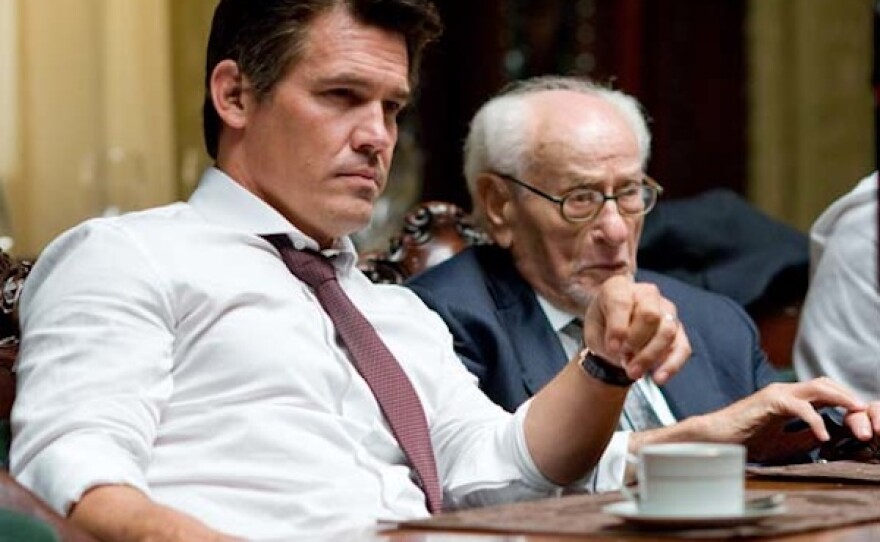“White Wedding” (opened October 1 at Landmark’s Hillcrest Cinemas) is a romantic comedy from South Africa. Yes you heard me right.
Most of what we see about South Africa in movies isn’t pretty. There’s apartheid in “Cry Freedom,” the Soweto Uprising in “A Dry White Season,” and poverty and prejudice in “Tsotsi.” And then along comes “White Wedding,” something of a feel-good film about post-apartheid South Africa.
It’s a road picture in a vein similar to “The Hangover” in the sense it's a groom is trying to get to his wedding, and everything seems to conspire against him much to the ire of his bride-to-be. Elvis (Kenneth Nkosi) is the man about to marry and Tumi (Rapulana Seiphemo) is his womanizing best man. They are on the road to pick up the bride’s grandmother while the bride, Ayanda (Zandile Msutwana), mediates between her mother and a gay wedding planner. The film is meant to be a wacky comedy about the trials and tribulations of relationships, and a superficial glance at cultures and customs in conflict.

The film trivializes real problems in South Africa so I won’t feel bad saying that "White Wedding" makes it seem like the biggest danger facing the post-apartheid South African film industry is falling victim to Hollywood clichés. Apparently the gay wedding planner is a stereotype that works in any culture as is the pushy mother-in-law and crazy grandmother. Then it hits the familiar notion of men and women just being doomed to misinterpret each other's actions and motives but with love triumphing in the end. "White Wedding" makes up a trilogy of films that I am dubbing the Misguided Feel-Good Movies of the Year. "Wall Street 2" was the feel-good economic crisis film, "White Wedding" spins a feel-good take on apartheid, and the upcoming "It's a Funny Kind of Story" makes suicide and mental institutions feel way too good. I'm not saying that you have to always tackle serious subjects in a serious or gloomy manner but if you trivialize these subjects for no other reason than you are a lazy filmmaker playing into a cliched formula, then you will stir my ire.
Director Jann Turner is white and female, and has said that she wants to tell stories that are “fun, real, and normal.” Stories that might not be what Americans expect. The only problem is that she uses a very American comedy formula to tell her story and only rarely finds something that feels real about her own country. She delivers simplistic stereotypes of South Africans and at one point lets a few drinks resolve the racial tensions in a bar. I know this is a comedy and I should cut it some slack in terms of dealing with real world issues. But Turner reduces her characters and her country's problems to such silliness and such simplistic terms that it becomes annoying. There are moments when she captures the beauty of the South African landscape or gives us a clue to what some of the real cultural differences affecting a post colonial country are like but these moments are too rare.
If you want a true taste of African filmmaking try a filmmaker like Ousmane Sembène or Djibril Diop Mambéty, both from Senegal. They tackle truly African stories and in a narrative structure that is uniquely African. They are not imitating Hollywood formulas or even an American sense of time and linear storytelling. We rarely get films from these kind of African filmmakers, films that really challenge our expectations on both a cultural and cinematic level. Instead we get mindless blather like “White Wedding.”

Turner may have good intentions in terms of showing us that there’s more to South Africa than civil unrest and starving children, the cliches Hollywood films may too often present us with. But what she chooses to show in their place are nothing more than lame stereotypes and clichéd ideas about men, women, and relationships.
“White Wedding” (unrated and in Zulu, Afrikaans, and Xhosa with English subtitles) may have a sweet outlook on the world and an optimistic sense that everything will work out fine. But it’s hard to swallow because Turner is not a good enough filmmaker, and political and social realities hover too strongly over her film. Too bad Turner didn’t look a little further back in Hollywood history and maybe try to imitate Frank Capra or Preston Sturges, American filmmakers with a gift for comedy but also a knack for breaking rules and commenting on the world in unexpected ways.
Companion viewing: “Touki Bouki,” “Xala,” “Nowhere in Africa”






